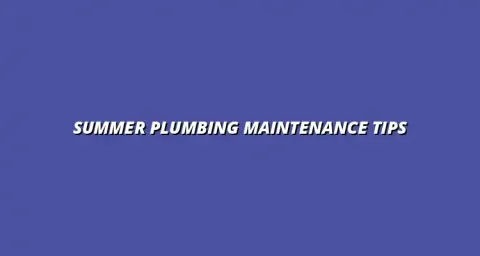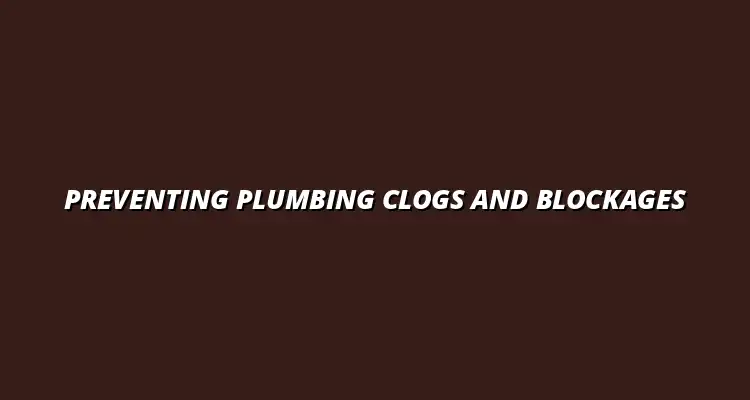
- Beginner Tips
- Mar 03
2025-02-14
Preventing plumbing clogs and blockages is crucial for maintaining the overall health of our homes. Clogged drains can lead to significant problems, from annoying slow draining sinks to major plumbing disasters. By understanding the common causes of clogs and recognizing their impact, we can take steps to avoid these unwanted issues. Learning how to prevent costly plumbing repairs is a crucial first step for every homeowner.
It's important to acknowledge that many homeowners face plumbing problems at some point. However, with the right knowledge and proactive measures, we can minimize the occurrence of these issues. Let’s dive into the common causes of plumbing clogs and how they affect our daily lives!
Identifying the common causes of clogs can help us take preventive action. The plumbing systems in our households can be affected by various factors, and recognizing these can lead to better maintenance practices. Here are some of the typical culprits behind plumbing issues:
One of the main causes of clogs is the disposal of food waste and grease. When we pour fats, oils, or greases down the drain, they can harden and stick to the pipe walls. Over time, this buildup can create blockages that restrict water flow. To avoid blockages in your kitchen sink, check out these helpful tips on preventing kitchen sink blockages.
To avoid this, we should always dispose of grease in a separate container. Additionally, using a strainer in the sink can help catch any food particles before they go down the drain.
Hair and soap scum are notorious for causing slow drains, especially in bathrooms. When hair combines with soap residue, it forms a thick mass that can clog pipes. Regularly cleaning drains can help mitigate this issue. If you're dealing with a clogged bathroom sink, this guide on unclogging your bathroom sink can be a lifesaver.
To prevent buildup, consider using a drain screen to catch hair before it enters the plumbing system. It’s a simple yet effective way to keep those pesky clogs at bay!
Sometimes, foreign objects can accidentally find their way into drains, leading to unexpected clogs. Items like toys, cotton balls, or even dental floss can create blockages that disrupt water flow. It’s essential to be mindful of what we dispose of in our sinks and toilets. For comprehensive advice on preventing clogged drains, see our guide on preventing clogged drains.
To prevent this, always encourage family members to be cautious about what goes down the drain. Ensuring that only appropriate items are flushed can save a lot of hassle in the future!
The consequences of clogged drains extend beyond mere inconvenience. Clogs can have serious implications for both our homes and our health. Understanding these effects can motivate us to take preventive measures seriously. Taking proactive steps towards plumbing safety can prevent many problems, learn more with our guide on home plumbing safety tips.
Here are some of the impacts clogged drains can have:
Clogs can significantly affect water flow and pressure in our homes. When pipes are blocked, water struggles to move freely, leading to slow drainage or even backups. This can be frustrating when using sinks, showers, or washing machines.
In severe cases, clogged drains can lead to total disruption of water services, making it challenging to perform daily tasks. Regular maintenance and awareness of potential causes can help maintain proper water flow.
Another serious consequence of clogs is the risk of water damage and mold growth. When water accumulates due to a blockage, it can overflow and damage surrounding areas. This can not only result in costly repairs but also create a breeding ground for mold.
Mold poses serious health risks, especially for individuals with allergies or respiratory issues. Preventing clogs can therefore safeguard both our homes and well-being, making it a priority for every homeowner!
As homeowners, we often find ourselves wondering about the best ways to keep our plumbing systems running smoothly. It's essential to be aware of the signs of potential clogs so we can take action before problems escalate. Understanding what to look for can save us from costly repairs and unwanted headaches!
Some common signs that indicate a possible clog include:
Recognizing these warning signs early can make a significant difference in maintaining the health of your plumbing system. If you notice any of these issues, it’s a good idea to address them promptly!
Regular inspections of your plumbing system are essential for preventing major problems. As a rule of thumb, I recommend checking your plumbing at least once a year. However, if you encounter frequent issues or live in an older home, you might want to increase the frequency of these inspections. Winterizing your plumbing is especially important; find tips on winter plumbing preparation to avoid costly damage.
During a plumbing inspection, consider focusing on the following areas:
Staying proactive about plumbing maintenance can lead to a healthier, longer-lasting system in your home. Don't wait for a problem to arise; a little routine care goes a long way!
Investing time and resources into your plumbing system can significantly enhance its performance and longevity. One way to ensure that your home remains clog-free is by considering upgrades that promote better flow and efficiency. This not only helps with potential clogs but can also save you money on your water bill! For those in Billesley, Birmingham, consider a local plumber for installations and repairs: Plumber in Billesley, Birmingham.
Upgrading your plumbing fixtures and pipes might seem like a hassle, but it’s a worthwhile investment in the long run! Here are some key upgrades to consider for effective clog prevention:
Remember, investing in quality materials can save you from frequent repairs and costly plumbing bills. It’s about making smart choices for your home!
When upgrading your plumbing, it’s crucial to choose high-quality pipes and fixtures. Not only do these materials resist clogs, but they also enhance overall water flow. Deliberate upgrades can lead to fewer plumbing issues and a more efficient system.
A water softening system can also play a significant role in preventing clogs. Hard water can leave mineral deposits in pipes, leading to blockages over time. Installing a water softener helps to reduce these deposits, keeping your plumbing system healthy!
Establishing good habits within your household is vital for maintaining clear drains. Educating your family members on proper waste disposal techniques can prevent many common plumbing issues. By working together, you can keep your plumbing running smoothly!
Make sure everyone in your home understands what can and cannot go down the drain. Here are some key points to share:
By fostering awareness, you can significantly reduce the occurrence of clogs!
Creating a plumbing maintenance schedule can help ensure that your system remains in good condition. Marking regular inspections and cleaning tasks on your calendar can keep everyone accountable. Consistency is key!
Sustainable plumbing practices are not just environmentally friendly; they can also save you money and trouble in the long run. Embracing eco-friendly products for drain care can make a significant difference. Look for biodegradable cleaners and products that minimize environmental impact.
Using eco-friendly products doesn’t mean compromising on effectiveness. Here are some benefits of choosing sustainable options:
It’s easy to make a positive impact while caring for your plumbing system!
Lastly, don’t hesitate to call in professionals for regular plumbing check-ups. They can catch issues before they become serious problems. Regular maintenance from experts not only helps ensure that your plumbing stays in top shape but also provides peace of mind!
